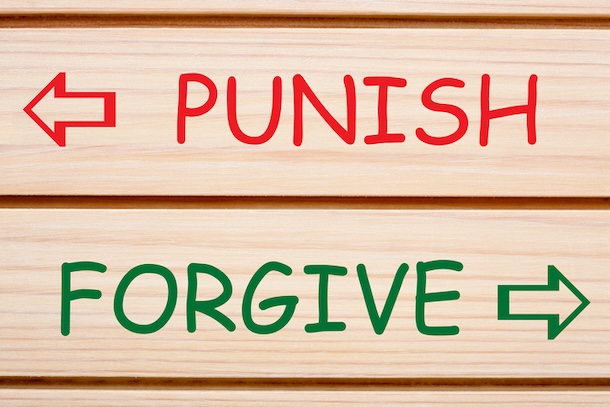Resentment vs. Forgiveness
By Dr. Margaret PaulJanuary 15, 2024
Are you stuck in blame and resentment toward someone, feeling like a victim of another's choices? Do you find it impossible to forgive?
 "I'll never forgive Andrew for what he did to me. He doesn't deserve my forgiveness," Carolyn told me in one of our early phone sessions.
"I'll never forgive Andrew for what he did to me. He doesn't deserve my forgiveness," Carolyn told me in one of our early phone sessions.
Carolyn's focus was on whether or not Andrew deserved to be forgiven, rather than on whether it was loving to her to forgive or to continue holding resentment.
Take a moment to tune into how you feel when you choose to hold on to blame.
Do you feel happy, open, peaceful, and joyous, or do you feel angry, tense, closed, and unhappy?
What Carolyn didn't realize is that forgiving someone is not about them. It is about taking loving care of ourselves by releasing ourselves from resentment and blame. It is about moving out of being a victim of others' choices and taking responsibility for our own feelings of wellbeing.
"But what Andrew did was unforgivable," Carolyn told me. "How can I forgive him for cheating on me and ruining our marriage? How can I forgive him for leaving me for a younger woman, for breaking up our family, and for the pain he has caused our children? What he did hurt so many people. Why should I forgive him for it? Wouldn't that be the same as condoning his behavior?"
This is a common misconception - that forgiveness is the same as condoning.
I remember reading about a woman whose adolescent son got shot and killed by another adolescent boy. While this mother was deeply heartbroken and never condoned what the other boy did, she not only forgave him, she got to know him and helped him to heal the pain that led to his shooting her son.
It is not loving to ourselves to condone others' unloving behavior, nor is it loving to ourselves to continue to hold negative feelings in our body. The energy of resentment and blame brings down our frequency, making it impossible to connect with our guidance. Resentment is like a poison that continues to feed upon itself, creating more and more darkness.
"Carolyn, what are you afraid of if you let go of your resentment and forgive Andrew for what he did?"
"I'm afraid he will think that what he did is okay."
"At this point, why are you concerned with what he thinks? What difference does it make to your life right now what he thinks?"
"I just don't want him to think that he can just act like this and get away with it."
"So you are punishing him by holding blame and resentment within yourself?"
"Yeah, I guess I am. He should be punished."
"And who do you think is suffering as a result of your punishing him?"
"Well, certainly not him! He is having the time of his life!"
"Are you suffering as a result of focusing on punishing him instead of taking loving care of yourself?"
"Well, I am miserable. But I'm miserable because of what he did to me."
"I know that is what you believe, but the truth is that you are miserable because you are focusing on punishing him rather than on taking loving care of yourself. You are being a victim, blaming him for your feelings. Your feelings are being caused by what you are telling yourself and how you are treating yourself - not by anything Andrew has done. From what you told me in our last session, you weren't any happier before Andrew left than you are now. You were always making him responsible for you and he never did it right enough for you. As long as you have your eyes on him instead of on taking loving care of yourself, you will feel miserable."
"I'm tired of being miserable. That's why I called you. But I don't know how to forgive him."
"Carolyn, forgiveness is a natural outcome of taking loving care of yourself. As you practice Inner Bonding and learn how to take responsibility for your own pain and joy, you will stop blaming Andrew for your feelings. The more you learn how to love the beautiful essence that is within you, the more you will find yourself forgiving Andrew."
Resentment toward others is a clear sign that we are not taking care of ourselves. As you shift your intent from blaming others to loving yourself, you will find that forgiveness follows naturally.
Join Dr. Margaret Paul for her 30-Day at-home Course: "Love Yourself: An Inner Bonding Experience to Heal Anxiety, Depression, Shame, Addictions and Relationships."
 Send this article to a friend
Send this article to a friend  Print this article
Print this article  Bookmarked 0 time(s)
Bookmarked 0 time(s)
| Related Articles |
|---|
| The Poison of Resentment |
| Reaching Forgiveness |
Comments
| Author | Comment | Date |
|---|---|---|
| Join the Inner Bonding Community to add your comment to articles and see the comments of others... | ||

Daily Inspiration
When we die and leave our bodies, all fear falls away. We are left with our pure Self. Did we allow this Self to shine? Or did we cover this Self with a shroud of fear? That is the question we will be faced with when we leave our bodies. Let's not wait. Let's face it now.
By Dr. Margaret Paul

 Share with Del.icio.us
Share with Del.icio.us Share with Digg
Share with Digg






